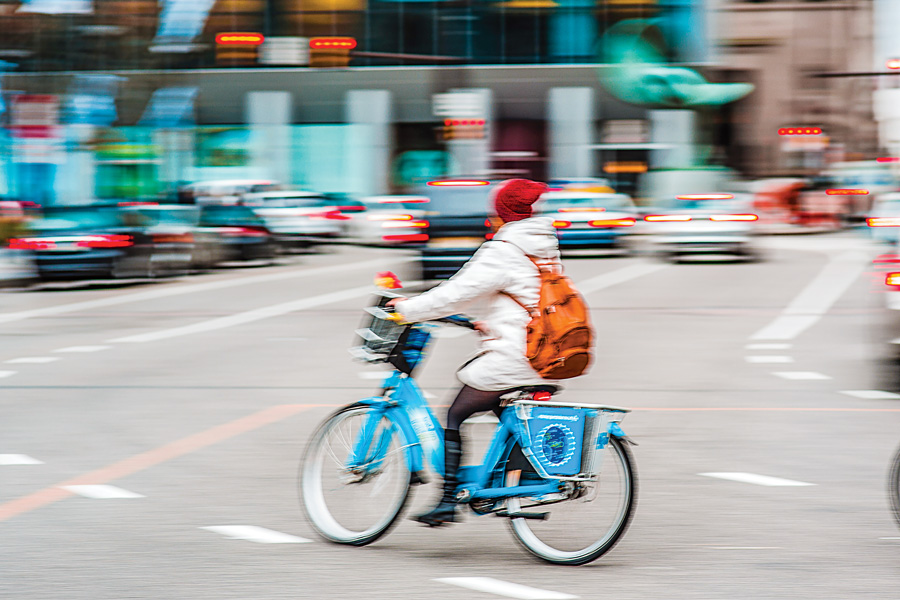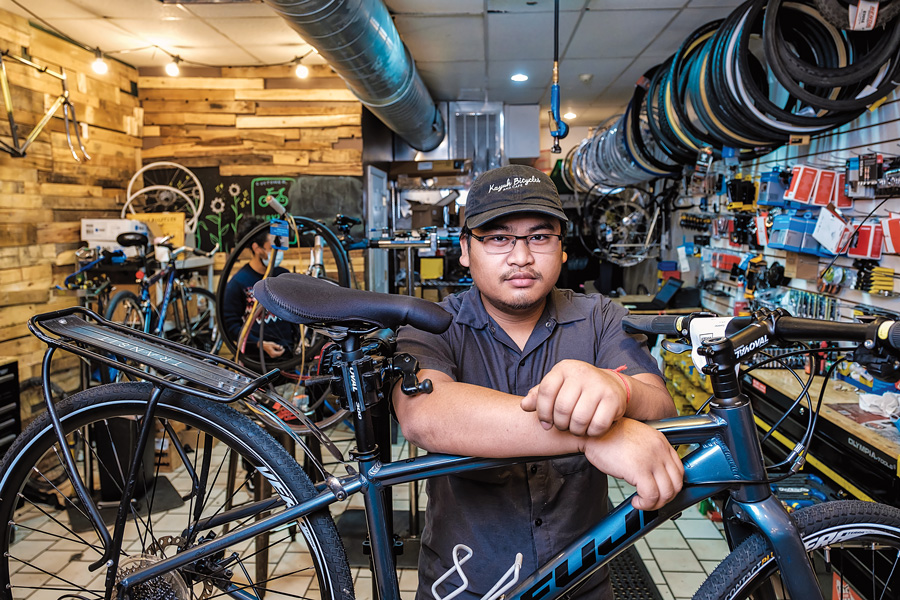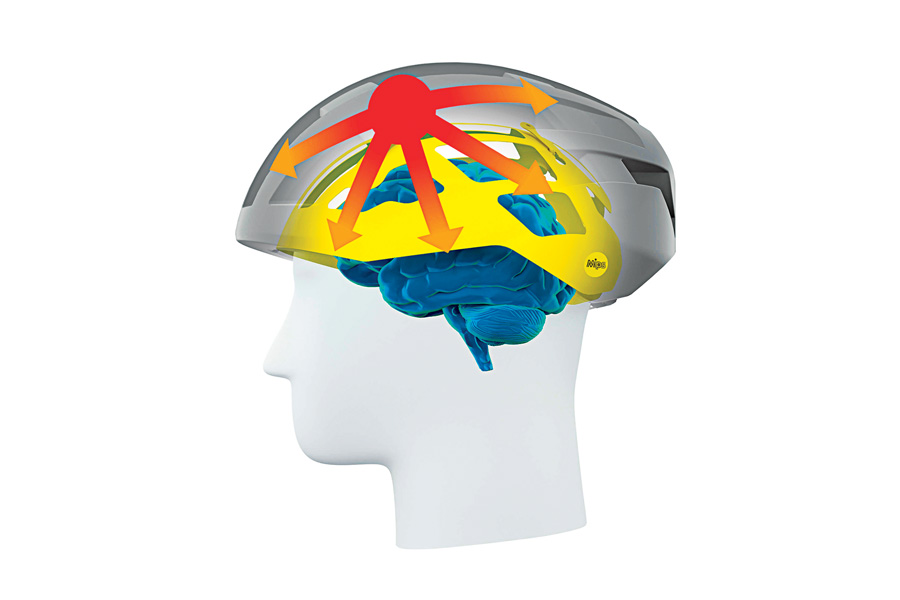Philly Cyclists Share Their Best Advice for Buying Gear and Riding in the City Safely
From how to find a good helmet to where to practice until you’re more comfortable on the road.

One good piece of Philly biking advice? Get some practice on Indego bikes. Photograph by Jeff Fusco
Are you one of the many Philadelphians that’s gotten into biking in the last year? Whether you’re totally new to traveling on two wheels or you’re getting back into it, here’s what local pros advise.
“Keep your distance from parked cars. On one-way streets, bike on the left side of the road instead of the right. On busy streets, try to give yourself three to four feet in case someone opens a door. Always keep your hand on the brake lever in case someone surprises you.” — Henry Sam, owner of Kayuh Bicycles and Café, Francisville

Henry Sam, owner of Kayuh Bicycles and Café. Photograph by Jeff Fusco
“Obey all the traffic laws, just as if you’re a car. Cars are unable to stop immediately if you blow through a stop sign or stoplight.” — Charlie West, triathlete, Pottstown
“Avoid train and trolley tracks, such as on Girard Avenue. You can pop a tire easily and can also get the wheel stuck or bent. If you need to ride on those roads, go slower than usual over them, and watch for cars and trains.” — Lia Belardo, Ironman finisher, Grad Hospital
“Join a group ride, like with Bicycle Club of Philadelphia. It’s safer, and it will get you familiar with routes and introduce you to cyclists at your own ability level.” — Matthew Hall, former Center City bike messenger, Roxborough

Soj Jibowu, founder of Cherry Hill-based Varlo Apparel. Photography by Jonathan Arena
“Always soak and rinse a cycling jersey post-ride. Many are made with awesome dry-wicking material. Unfortunately, those fibers hold the bacteria from your sweat. The odor can be hard to get rid of unless you rinse your gear after rides.” — Soj Jibowu, founder and CEO of Varlo Apparel, Cherry Hill
“If you want to experience the joy of riding in the city — minus the commitment — try Indego. There are stations all over, so it’s easy to give it a go.” — Reggie Waller, Ironman finisher, Phoenixville
“Spring for a helmet with an ANGi sensor. It connects to an app that alerts designated contacts when you’re riding. If you crash, it will let someone know your location.” — Michele Siconolfi, triathlete, Cherry Hill
“Invest in a good bike lock. And don’t leave your bike unattended for long, even with a good lock.” — Chris Mahnken, triathlete, Sicklerville
“When you’re just starting out, try a trail like the Schuylkill River Trail during early morning or late evening, to avoid some of the traffic while you get comfortable riding.” — Crystal Dixon, competitive cyclist, Lansdowne
Gearing Up!
There’s no one-size-fits-all bicycle — “Your bike is a personal preference in style, fit and features,” explains Michael Daniel Wilson, a triathlon and ultra-endurance coach from Pennsauken. However, there are some things newbie bikers should note when first outfitting their rides. Here, Wilson’s recommendations for what to keep in mind when you’re starting out.
Tires
Start with: Tires specify what type of terrain they’re for — a commuter tire will be durable and puncture-resistant. Hybrid commuter tires tend to have an inverted, slightly knobby tread and are good for traversing the city in all weather.
Avoid: Tall, skinny tires. These are good for racing but not the best for all weather conditions. They also get stuck in tracks more easily.
Pay attention to: Your tire repair kit. Have a more experienced rider show you how to check your tire pressure regularly, use your pump, replace your tire, and change your tube.

Make sure your helmet has a Multi-Directional Impact Protection System. Illustration by Charlie Layton
Helmet
Start with: A helmet with a Multi-Directional Impact Protection System (MIPS) will protect you in case of an accident and can help prevent brain injury.
Avoid: A used helmet, whether it’s been in an accident or not. A helmet should be replaced every three years, at minimum.
Pay attention to: How your helmet fits. If it’s too roomy, size down. The fit should be snug for safety.
Handlebars
Start with: Most commuter bikes have mid-range-width handlebars, which are better for maneuvering. That said, it’s really a matter of preference and comfort.
Avoid: Narrow drop handlebars are for more experienced riders. A novice may not be able to maneuver well through Philly with this style.
Pay attention to: How your hands and wrists feel when you grip the bars. A sensation of discomfort or wrists being at awkward angles can help determine if you need wider or narrower handlebars.
Brakes
Start with: Disc brakes, which offer more controlled stopping and are easier to maintain.
Avoid: Rim brakes. They’re less expensive, but they’re also less predictable, which can be dangerous when you’re just starting out.
Pay attention to: If rim brakes are standard on your bike, observe the wear and tear and how they handle wet weather conditions. If your brakes seem worn at all, leave repair to a professional.
Shoes
Start with: Clipped-in shoes are a game changer. You’ll gain power and better handling, and they can help mitigate knee pain while you ride.
Avoid: Open-toed shoes or sandals. There are alternatives to clipped-in shoes, but open-toes are never okay.
Pay attention to: A snug but not too tight fit. Your heel shouldn’t slide up and down, and your arch should feel supported.
Saddle
Start with: Cushioning. Comfort matters above all else — if you aren’t wearing padded shorts, make sure your saddle has some spring.
Avoid: A racing-style saddle for commuting. It makes for a stiff, uncomfortable ride and could turn you off cycling before you get started.
Pay attention to: There are many different types. Try out a saddle before you buy it, since comfort levels are different for everyone.
Published as “Wheel Talk: Biking Advice From Local Pros” in the Be Well Philly 2021 issue.


